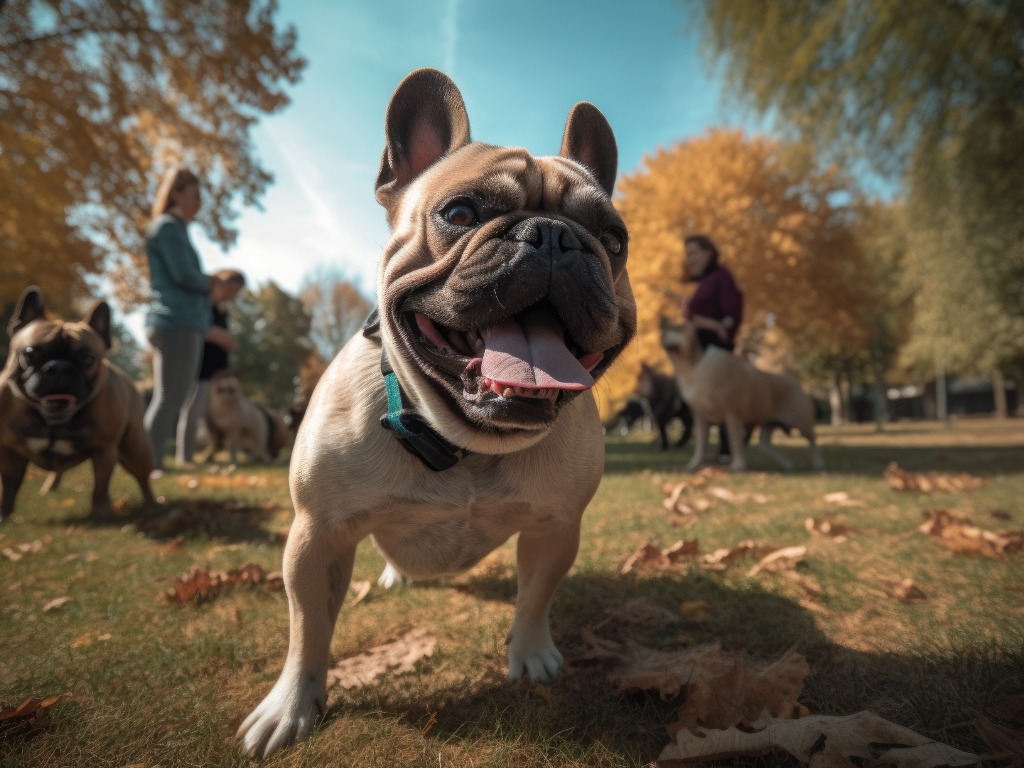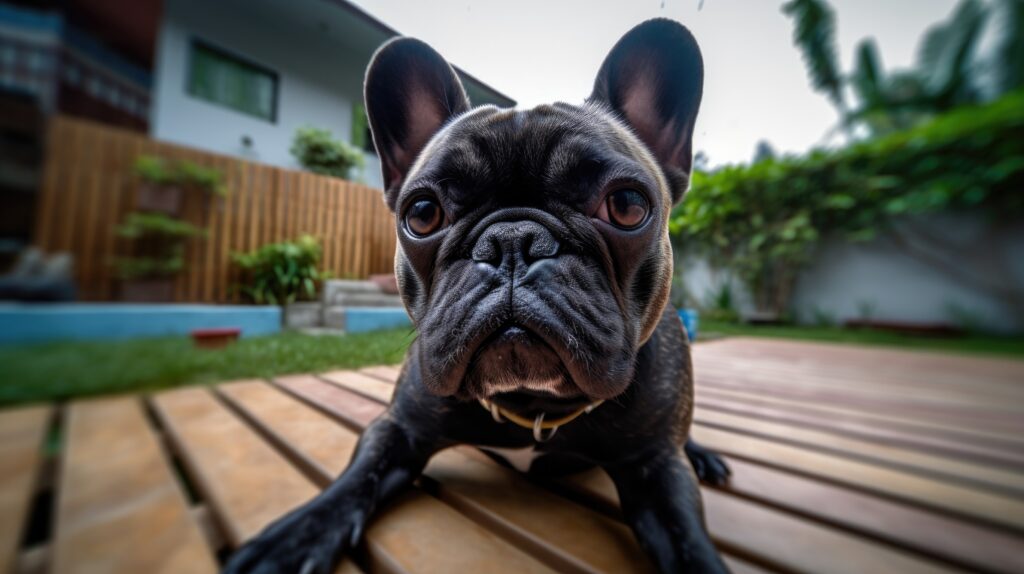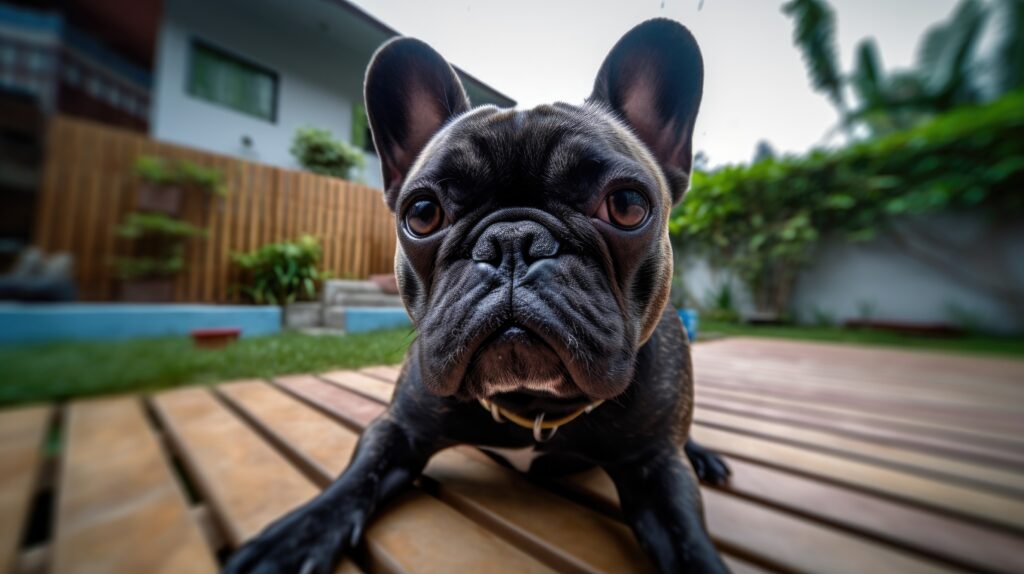Why Do French Bulldogs Make Weird Noises: An Explanation
French Bulldogs are adorable and lovable pets but are also known for their unique and sometimes strange noises. These noises can range from snorting and snuffling to wheezing and grunting. If you are a French Bulldog owner, you may have wondered why your furry friend makes these weird noises.


The answer lies in their anatomy. French Bulldogs have a short snout and a flat face, which can cause breathing difficulties. This condition is known as brachycephalic syndrome, affecting many flat-faced breeds, including Pugs and Bulldogs. The shortened airway in French Bulldogs can cause them to snort, snuffle, and wheeze, especially when excited or active. It can also make breathing difficult for them, especially in hot weather or when they are under stress.
Table of Contents
Anatomy and Physiology


French Bulldogs’ distinct physical appearance sets them apart from other dog breeds. Their unique anatomy plays a significant role in their sounds, especially when breathing. Understanding the anatomy and physiology of French Bulldogs can help explain why they make weird noises.
Respiratory System
French Bulldogs have a short and narrow respiratory system, which makes it difficult for them to breathe. They have a small trachea, narrow nostrils, and a compressed upper airway. As a result, they are prone to respiratory problems, such as brachycephalic obstructive airway syndrome (BOAS).
BOAS is a condition that affects dogs with short snouts, such as French Bulldogs. It occurs when the airway is obstructed, making breathing difficult for the dog. Symptoms of BOAS include snoring, wheezing, and difficulty breathing, especially during exercise or in hot weather.
Nasal Cavity
French Bulldogs have a small and narrow nasal cavity, making it difficult to breathe through their nose. They often breathe through their mouth, which can cause them to make weird noises. Their nasal cavity is also prone to infections, further exacerbating their breathing problems.
Soft Palate
The soft palate is the tissue that separates the nasal cavity from the oral cavity. In French Bulldogs, the soft palate is often elongated, which can obstruct the airway and cause breathing problems. The elongated soft palate can also cause snoring and make it difficult for the dog to eat and drink.
The unique anatomy and physiology of French Bulldogs play a significant role in the sounds they make. French Bulldogs have a short and narrow respiratory system, a small and narrow nasal cavity, and an elongated soft palate, which can cause them to make weird noises. Understanding their anatomy and physiology can help owners provide better care and treatment for their furry friends.
Breed Characteristics


French Bulldogs are a popular breed known for their affectionate and playful personality. However, they are also known for making weird noises that sometimes concern their owners. In this section, we will explore the breed characteristics of French Bulldogs and how they relate to their unique sounds.
Brachycephalic Breed
French Bulldogs are a brachycephalic breed, which means they have a short, flat snout and a compressed upper respiratory system. This conformation can lead to various health issues, including respiratory problems and overheating. The shape of their skull can also contribute to their unique sounds, such as snorting, snuffling, and wheezing.
Genetics
The genetics of French Bulldogs also play a role in their unique sounds. According to a study published in PLOS ONE, French Bulldogs have a higher respiratory noise prevalence than other small breeds, such as Pugs and Pekingese. This may be due to genetic factors that affect the structure and function of their respiratory system.
Temperament
French Bulldogs are known for their friendly and affectionate personality but can also be stubborn and vocal. They are a breed that likes to communicate with their owners, and their unique sounds may be a way of expressing themselves. French Bulldogs are also known to snore, which signify relaxation and contentment.
Overall, French Bulldogs are a unique breed with distinct characteristics. Their brachycephalic conformation, genetics, and temperament contribute to their unique sounds. While their noises may concern some owners, they are generally harmless and a normal part of the breed.
Common Noises


French Bulldogs are known for their adorable and unique sounds. These noises can be entertaining and endearing to their owners but can also cause concern. This section will discuss some common noises that French Bulldogs make and what they might mean.
Snorting
Snorting is a common noise that French Bulldogs make, especially when they are excited or exercising. This noise is caused by the breed’s short snouts, which can make breathing difficult. However, if the snorting is excessive or accompanied by other symptoms such as coughing or wheezing, it may be a sign of a respiratory issue that requires veterinary attention.
Grunting
Grunting is another noise that French Bulldogs make, which is often associated with contentment or relaxation. This noise is usually nothing to worry about and is part of the breed’s unique personality. However, if the grunting is accompanied by other symptoms such as lethargy or loss of appetite, it may indicate an underlying health issue.
Wheezing
Wheezing is a noise that French Bulldogs make when they are having difficulty breathing. Various factors, including allergies, infections, or airway obstruction, can cause this noise. If your French Bulldog is wheezing, it is important to seek veterinary attention to determine the underlying cause and provide appropriate treatment.
Reverse Sneezing
Reverse sneezing is a common noise that French Bulldogs make, which can be alarming to their owners. This noise is caused by an irritation in the back of the throat and is usually nothing to worry about. However, if the reverse sneezing is frequent or accompanied by other symptoms such as coughing or vomiting, it may indicate an underlying health issue that requires veterinary attention.
In summary, French Bulldogs make various unique noises that are a part of their charming personality. However, monitoring these noises and seeking veterinary attention is important if they are excessive or accompanied by other symptoms. By understanding the common noises that French Bulldogs make, owners can better care for their furry friends and ensure their health and happiness.
Causes of Noises


French Bulldogs are known for their unique and adorable looks but also for making some strange noises. Various factors, including obesity, allergies, and upper respiratory infections can cause these noises.
Obesity
Obesity is a common problem in French Bulldogs. When a French Bulldog is overweight, it can put extra pressure on their respiratory system, making it harder for them to breathe. This can lead to snoring, wheezing, and other unusual noises.
Allergies
Like humans, French Bulldogs can also suffer from allergies. Allergies can cause inflammation in the airways, leading to breathing difficulties and unusual noises. Some common allergens for French Bulldogs include pollen, dust, and certain types of food.
Upper Respiratory Infections
Upper respiratory infections are another common cause of weird noises in French Bulldogs. These infections can cause inflammation and congestion in the airways, making it difficult for the dog to breathe normally. Symptoms of an upper respiratory infection include coughing, sneezing, and wheezing.
French Bulldogs can make some strange noises, but there are several potential causes for these sounds. Obesity, allergies, and upper respiratory infections are just a few factors that can contribute to unusual noises in French Bulldogs. If you are concerned about your French Bulldog’s breathing or any other symptoms, it is important to consult your veterinarian for a proper diagnosis and treatment plan.
Prevention and Treatment


Healthy Diet and Exercise
Maintaining a healthy diet and exercise routine can help prevent some respiratory issues that French bulldogs are prone to. A healthy diet can help control weight, which is important for reducing pressure on the respiratory system. Exercise can help improve overall health and strengthen the respiratory muscles.
Avoiding Triggers
French bulldogs are sensitive to environmental triggers like smoke, dust, and pollen. Owners should try to keep their environment as clean and dust-free as possible. Avoiding exposure to smoke and other irritants can also help prevent respiratory issues. Additionally, French bulldogs should be kept in a cool and well-ventilated environment to prevent overheating.
Medical Intervention
If French bulldogs are experiencing respiratory issues, it is important to seek medical intervention. In some cases, medication may be prescribed to help reduce inflammation and open up the airways. Surgery may also be necessary in severe cases to correct structural abnormalities in the respiratory system.
Prevention and treatment of respiratory issues in French bulldogs require lifestyle changes and medical intervention. By maintaining a healthy diet and exercise routine, avoiding triggers, and seeking medical intervention when necessary, owners can help their French bulldogs live a healthy and comfortable life.
